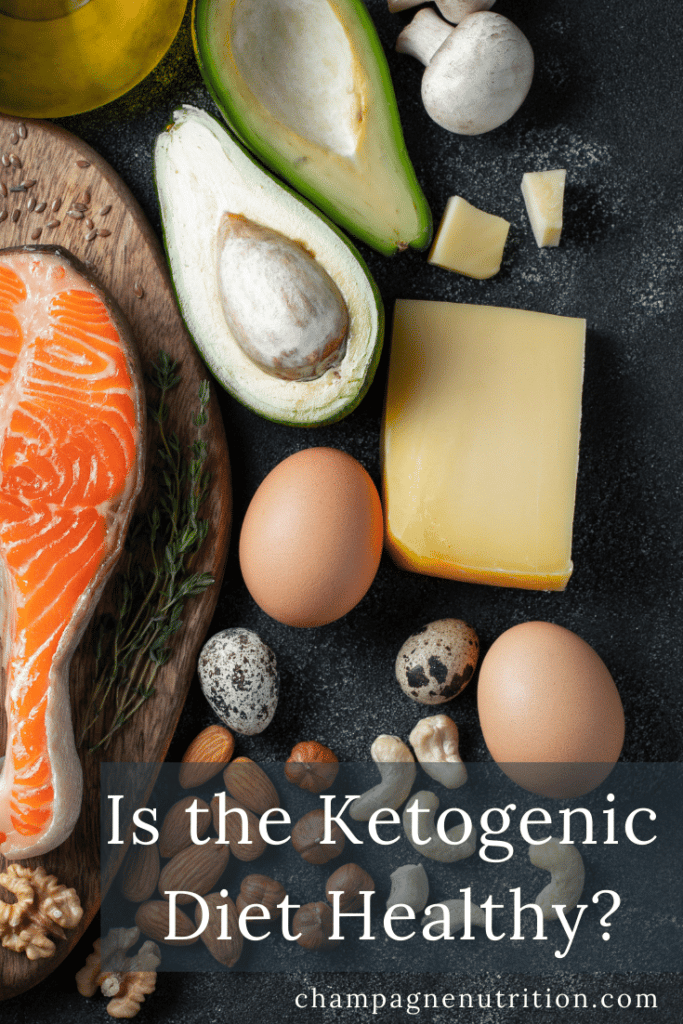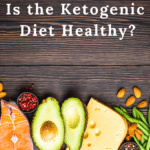Is the Ketogenic Diet Healthy?
January 11, 2019 by Ginger Hultin MS RDN
Ok all – let’s talk Keto. I’ve never seen a hotter diet trend and I’ve also never seen so much confusion and misinformation on one subject. There are many health care professionals against keto, but some are all for it…so is the ketogenic diet healthy?
I talk about keto a lot. I’ve given over 20 interviews on the subject and written articles about the science there, too. The most important thing is that you know what it is as we get started. I hear a lot of people say that they’re following a ketogenic diet but they’re actually far from it. There are a couple articles you should read to better understand the basics including this one I wrote for Food&Nutrition Magazine and also this one in Huffington Post.
If you need a snapshot of what the ketogenic diet is as well as how it’s different than low carb Paleo or Whole 30, here’s what you need to know in a nutshell:
Ketogenic Diet:
- High in fat: 80%+ total calories
- Moderate in protein: 1 gram/kilogram of body weight
- Low in carbohydrates: 40-60 grams per day from low glycemic index foods (<50)
- This is a very high fat, low carb diet. Eliminated foods include all fruit except a small amount of berries on occasion for some people, all grains and starchy veggies, beans, most soy products, some dairy, limits on portions of nuts/seeds. Artificial sweeteners can be used.
- Compare this to the general acceptable macronutrient distribution range (AMDR) which is: 45-65 percent of calories from carbs; 10-35 percent from protein; and 20-35 percent from fat. Keto is very different than how many people normally eat.
- It was used originally to treat people with epilepsy who weren’t responding well to medications. It’s quite effective for a variety of medical needs but it should be monitored by a medical team.
- There is some evidence now in humans that it’s effective for weight loss which is why I see most people using it.
Paleo/Whole 30:
- Less about macronutrient breakdown and more about overall food choices.
- Based on what people in the Paleolithic Era (earliest humans until 40,000 BC – 8000 BC) ate; a take on the “traditional” human diet. Though, this is a large span of time and humans inhabited many parts of the earth. They ate a varied diet and there isn’t one true “Paleo” diet, historically speaking.
- No grains, beans, soy, corn, dairy, alcohol. It is based on meat, fish, eggs, nuts, seeds, fruits, all veggies (even starchy), fat (coconut oil, olive oil, avocado oil, ghee), raw sugar/honey/stevia.
- For many, is part of a “Paleo” philosophy based on physical movement and exercise.
Simply put, the ketogenic diet is very high fat and very low carb. Take one wrong step and you’re not in ketosis any longer. Here’s my piece on “cheat days” on keto if you’re interested. If you’re eating barbecue sauce, you’re not keto. If you drink a margarita, you’re not keto. If you eat an apple, you may not be keto. It’s a very restrictive diet. And once you’re not in ketosis, it will take you a period of time to get back into it. To know if you’re actually in ketosis, you’ll need to test blood or urine.

So is the ketogenic diet healthy?
One thing that’s critical to understand is the pros and cons of keto. Before you start it, you really should be consulting with your doctor and get a dietitian on board. We’re talking serious potential consequences of this altered metabolism including kidney damage, severe constipation, micronutrient deficiencies (and need for targeted supplementation) including magnesium, omega-3 fatty acids, vitamin C, and sometimes electrolytes. The first 4-10 days on this diet can be tough as metabolism, electrolytes and fluids shift causing the “keto flu” including lethargy, muscle cramps and body aches, headache and gastrointestinal upset.
Understand that there isn’t one specific keto diet. Everyone is different and people can enter ketosis with varying levels of dietary carbohydrates though most are going to need fewer than 50 grams per day. This also happens at varying amounts of time on the diet ranging from 33 to 58 hours. Some people – especially children – will be admitted to the hospital when starting the keto diet for monitoring and safety. Foods and beverages must be closely monitored, calculated, measured and weighed for many people who need this for medical reasons. This is really serious business.
There is SO much to talk about regarding the ketogenic diet. I’ve discussed a variety of topics with publications including:
- Targeted Ketogenic Diet in Men’s Health
- Supplements you may need on a keto diet in Health.com
- Weight loss (or lack thereof) on keto in Men’s Health
- Alcohol on a keto diet in Shape
- Fruit on a keto diet in Vitamin Shoppe
- Veggies not keto approved in Vitamin Shoppe
- Keto cycling in Pop Sugar
- Keto diet side effects in Prevention
Finally, many people want to know if I’m keto and I’ll tell you honestly that I’m not. The reason is because I’m a vegetarian so I’m not willing to cut out foods like beans, soy, fruit and some veggies in my diet. There are many huge, well done studies that show that vegetarian and vegan diets are among the healthiest diets out there and that they’re linked to decreased rates of heart disease, type 2 diabetes, high blood pressure, and even some forms of cancer. That’s what works best for me.
As a registered dietitian, I work with people on a huge range of diets – keto, Paleo, low carb, low fodmap, Mediterranean, DASH, vegan, macronutrient – you name it. My bottom line is making sure that whatever you choose to do is right for you and helping your health and happiness rather than hurting it.
Now I need to know what YOU think about keto. Have you tried it? What are your pros and cons? What other questions do you have? Let me know and we’ll continue the conversation together.
10 Comments
Leave a Comment

Ginger Hultin,MS, RD, CSO
Thanks for visiting! If you're struggling with a cancer diagnosis, autoimmune condition, gut health problems, or even a medical mystery, nutrition can make a HUGE difference in your day-to-day life. I run a virtual, concierge private practice where I partner with my clients over time to help them improve their health through nutrition. Be sure to visit the blog for easy, plant-based, anti-inflammatory recipes and our "Resources" page for a variety of self-paced programs, books, e-books, and nutrition podcast episodes.




This is an excellent breakdown Ginger! Looking forward to reading my way through all your links too. Lots of misinformation out there so thanks for posting this concise description. 🙂
That’s awesome that you’ve been quoted in so many articles about keto! Way to kick ass 🙂
Thanks! I talk about it SO much so I just feel so passionately about covering it well 🙂
Thanks so much for sharing all of the pros and cons on this!
Thanks so much for the informative post!
Great idea to break down the pros and cons. You def need to weight those out before beginning any lifestyle change, especially a Keto diet. Way to go!
Thank you, Ginger! This information is amazing!
Thanks, my friend!
Thanks for sharing this nice post I like your post too much.